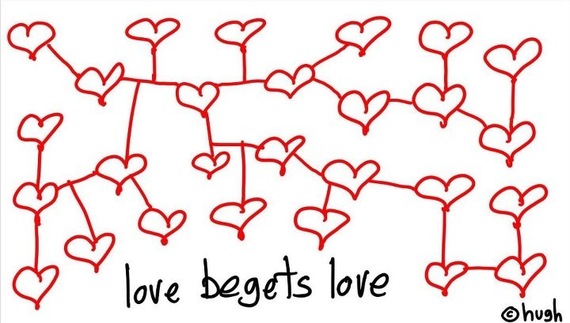
We all want security. In fact, as humans, it often becomes a primal and determined quest for many of us. We may partially seek it through money, beauty or achievements, but overwhelmingly the area where we really hope to find a sense of security is in our personal relationships. The assumption is "If I'm lovable, I'm safe." In order to up our love-ability quotient, we consciously or unconsciously engage in behaviors that we think will make us special and valued in the eyes of the world. In short, we see love-ability as something given to us by other people -- something we earn by being funny, pretty, successful or smart.
A bit disturbing, right? But in a way, it's natural we would think that. After all, we learn from earliest childhood that a certain set of behaviors creates a certain response in our parents, peers and teachers. Be fit, dress cute, get good grades, have a big personality and it all adds up to increased love-ablilty. So by the time we reach adulthood, we've developed certain habituated patterns of behavior that we're convinced will save us from abandonment and loneliness.
Here's the problem. We're running scared. We love nervously. We've become addicted to approval and no amount of approval ever feels enough. One word of criticism can cancel out twenty compliments, we overreact when our partner pulls away or our friend disagrees, and we have to get up tomorrow morning and start earning that love all over again. Beneath it all is the underlying fear that maybe the people in our lives don't really love us, they just love our behaviors. The moment we can't uphold the behaviors -- the moment we become old, fat, weepy or unemployed -- the love will go away. On some subconscious level we know that all we're buying with our approval-seeking behaviors is... approval. And approval is a pale echo of the real, honest, unshakeable, gutsy, no-matter-what love we really crave.
The truth is that love-ability isn't something that other people can give you and not something they can take away. True love-ability is an attitude. It's a way of being. It's the way you show up in the world. And because it's not based on the reactions of others, it is the deepest security, created from the only thing in life you can totally control, i.e. your own spirit.
Look at the word itself: LOVE-ABILITY. Boiled down to the essence, lovability is the ability to love. And if you can learn to love other people without expectation you will have ultimate security. The focus shifts from "Does he value me?" to "How can I show this person how much I value him?" Your intention is to show love, give love, and be love and your interactions with other people come from your soul with no explanations and no manipulation. Make the focus of control in your life be based on intrinsic generosity above extrinsic result crafting. There's purity in loveability, a simplicity and a freedom. You'll do what you do that day because you want to do it and because you believe in it, not because you think it will create a specific reaction in someone else.
By now you're probably thinking "Hey, I don't get up every morning and manipulate people. I already do what I do out of love," but the ways in which we seek love through our behaviors can be very subtle. We all know someone who claims she's always available to her friends. She never says no. Sure, she can meet you for drinks, is happy to listen to your midnight problems, will spend her vacation helping you move to Seattle. She's there for everyone 24/7.
But the truth is, she's probably burning out. She may be over-promising and under delivering, compulsively saying yes to things she knows she doesn't have the time or energy to do, because underneath it, she's scared. She fears that if she isn't always there, the party will go on without her. Her friends will realize she's not so essential after all. She loves anxiously, without confidence that her relationships are real.
But deep loveability is all about radiating genuine confidence.
There are many ways to conceptualize confidence, but one way to think of it is this: The people who walk through life with the highest levels of confidence are those have earned the right to do that because they no longer live in fear of outcomes. They do the best they can, they behave in the way that seems right in the moment, they put it all out there, and then figure that whatever happens, happens. They are truly themselves and you can feel it from a mile away. What they say, think, feel, and do are distinctly in alignment. They realize they can't make people love them and they're cool with that. They can comfortably say "no."
The point is not to stop trying to help people and never reach out to a friend. It's great to take your lover to a fancy hotel for a weekend, or help that friend move, or work passionately to earn a promotion -- as long as you're not doing it out of fear and you've dropped your attachment to the outcomes you think these behaviors will bring. When you make choices with a brave and honest heart, people want to be with you. Not your behaviors, but you. And those are the relationships that have staying power.
Follow Leigh and Mind in Motion on Facebook at https://www.facebook.com/pages/Mind-in-Motion/177407369069539
Related
Sign up for Peacock to stream NBCU shows.
to stream NBCU shows.
